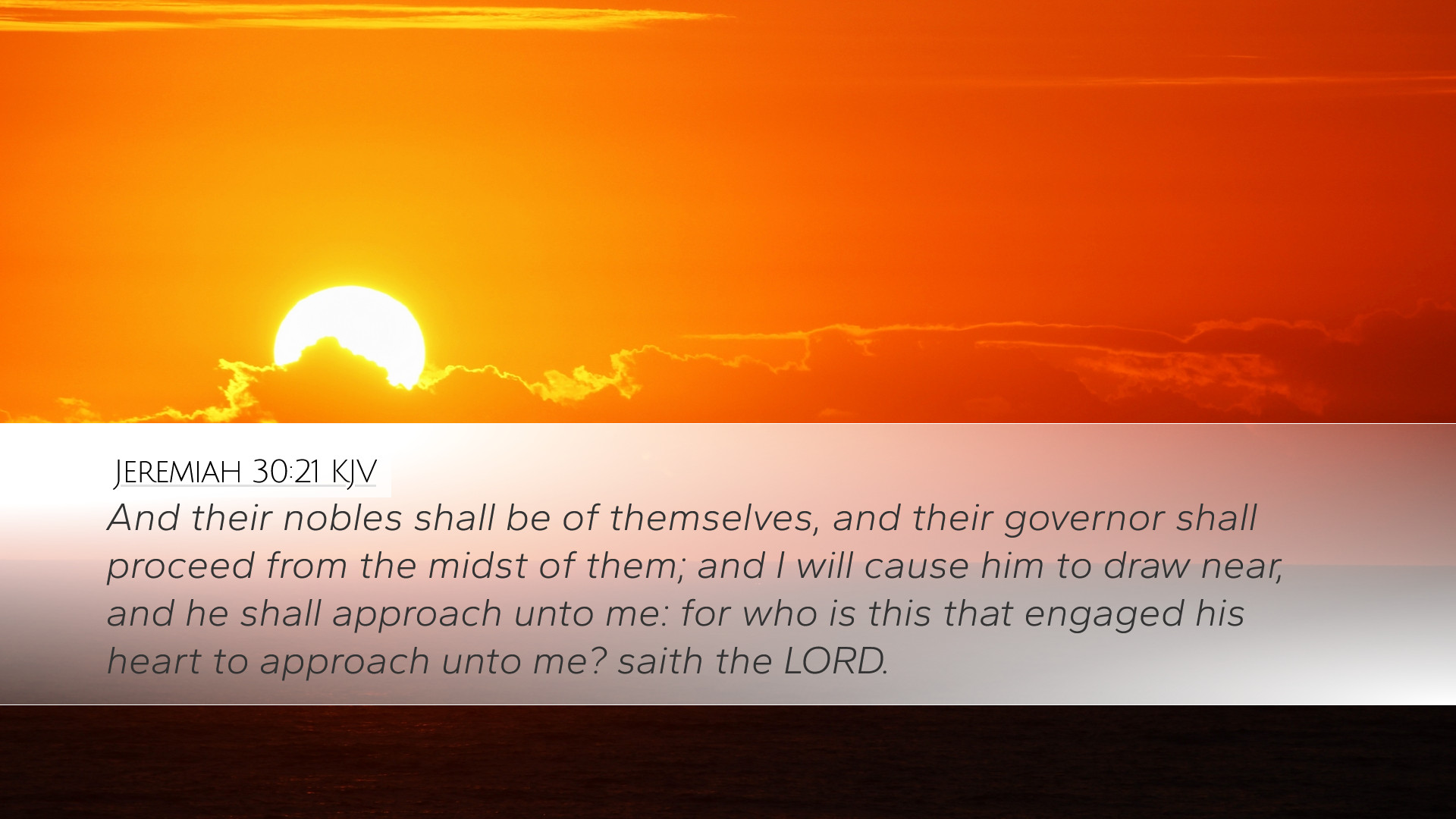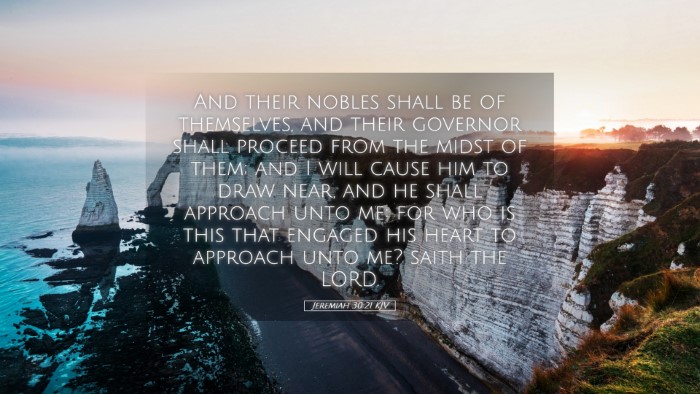Commentary on Jeremiah 30:21
Verse: "And their noble shall be of themselves, and their governor shall proceed from the midst of them; and I will cause him to draw near, and he shall approach unto me: for who is this that engaged his heart to approach unto me? saith the Lord."
Introduction
This verse comes from a significant portion of the Book of Jeremiah, where God promises restoration and renewal to His people Israel. As we explore Jeremiah 30:21, it is essential to consider the historical context of the Babylonian exile and the hope of eventual restoration. This passage holds profound theological implications concerning leadership and the covenant relationship between God and His people.
General Exegesis
The statement that "their noble shall be of themselves" suggests a return to self-determination and indigenous leadership. This is a restoration of dignity and identity for the Israelites, who had suffered under foreign rulers. The promise that "their governor shall proceed from the midst of them" reinforces the idea that leadership will come from within the community, reflecting divine approval and the sacredness of the covenant.
Matthew Henry's Commentary
Matthew Henry emphasizes the importance of God's choices in leadership. He notes that the noble, or the chief leader, will come from the people of Israel themselves, indicating a restoration not only of their land but also of their authority and autonomy. God’s intention to raise a governor from the midst of the people reflects His desire for a personal relationship with His chosen leaders.
- Divine Selection: Leadership is not arbitrary but ordained by God, which assures the Israelites of divine guidance.
- Covenant Relationship: The raising of leaders from among themselves illustrates God’s commitment to His covenant people, emphasizing mutual engagement.
Albert Barnes' Commentary
Albert Barnes highlights the significance of personal engagement with God. The phrase "I will cause him to draw near" suggests an intimate relationship initiated by God. Barnes points out that this promise culminates in the person who truly seeks God with a sincere heart. It emphasizes the importance of inner commitment in approaching the divine.
- Proximity to God: The leader's closeness to God serves as a model for the people, encouraging them to seek their relationship with Him.
- Divine Constancy: The Lord seeks those who are dedicated to His cause, revealing His expectations of both leaders and nations.
Adam Clarke's Commentary
Adam Clarke provides insights on the nature of the promised governor and his relationship to the people. He argues that the anticipated leader embodies the spirit of humility and servant leadership. Clarke notes that such governance would reflect the qualities that God desires in leadership: righteousness, justice, and compassion towards the people.
- Nature of Leadership: The governor will embody the traits of a good leader who prioritizes the needs and welfare of the people.
- Servanthood: The implication of servanthood positions this leader as a model for how God desires leaders to act within their communities.
Theological Implications
Jeremiah 30:21 provides profound theological implications that extend beyond the historical context. The promise of restoration through divinely appointed leadership speaks to the character of God as a redeemer. This draws us to Meditate on the active role God plays in guiding His people, ensuring that they are led by those who are both chosen by Him and representative of their collective identity.
Christological Reflection
This verse can also be seen as a foreshadowing of Christ, who ultimately fulfills the role of the true Governor. The New Testament emphasizes Christ as the Shepherd and the authoritative leader from the midst of His people. Just as God promised a ruler who draws near to Him, Jesus embodies the ultimate approach to God through His sacrifice and love.
Conclusion
In conclusion, Jeremiah 30:21 encapsulates not only the promise of leadership that is proximate to God but also highlights the expectations that leaders must engage with their hearts and lead with integrity. For pastors, students, theologians, and Bible scholars, this verse invites deep reflection on the qualities of leadership within the church today and encourages a return to God-centered governance that emphasizes servanthood, compassion, and divine guidance. As we consider this text, let us ask ourselves how we might embody the principles laid out by God and seek leaders within our communities who mirror His character.


